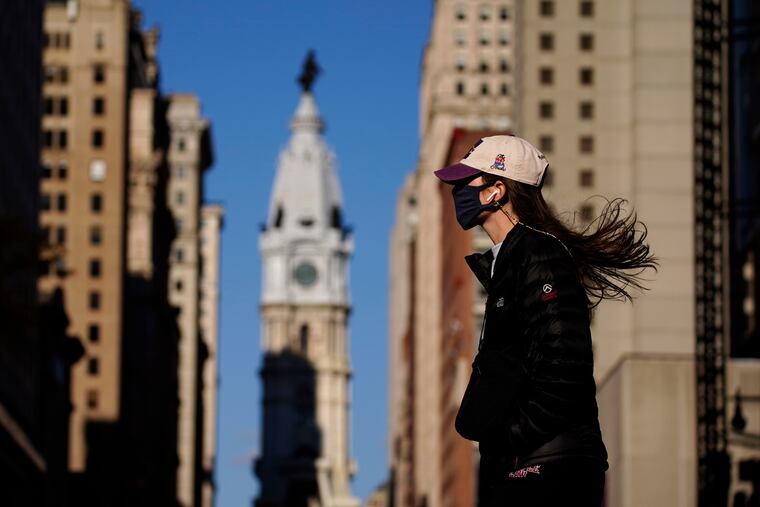Vaccines are on the horizon. Wear masks and socially distance to get us there. | Opinion
If we all wear masks when out in public, between now and March we could save over 60,000 lives.

Now that vaccines from Pfizer and Moderna show promise of being over 90% effective against infection from COVID-19, and the AstraZeneca vaccine appears effective as well, it is critical to do all we can to decrease the damage wrought by COVID-19 until the vaccines becomes available. The FDA advisory committee meets on December 10th, and hopefully the vaccine will be approved and available shortly afterward. If all goes well, a carefully crafted distribution plan will seek to maximize benefits with healthcare workers and medically vulnerable individuals perhaps getting the first doses of the vaccine by the end of the year. Then approximately a month later they will get the second dose of the vaccine, needed for immunity. It is likely that millions of people will be immunized by the spring.
Until then, Philadelphia recently instituted important regulations. As difficult as they are, it is crucial that we support them.
As the United States exceeds 250,000 deaths from COVID-19, we need to stand back and reflect on what over 250,000 deaths really means, and the importance of our continued efforts to prevent the spread of COVID-19 until vaccines become available. One of the best ways to understand something is to compare it with things we already understand.
The rate of COVID deaths compared to those other leading causes of death in the U.S. surprises most people—including doctors who care for these illnesses. When compared to previous years from March to November, COVID-19 has caused more deaths over about that same time period than gun violence, motor vehicle accidents, breast cancer, opioid overdoses, diabetes, and Alzheimer’s disease combined.
» READ MORE: Dr. Fauci on the holidays, the Biden transition, and the next phase of the COVID-19 pandemic
With this understanding, we can better appreciate the importance of supporting important public health measures that are being instituted across the country, including in Philadelphia.
The recommendations for what might be the most effective intervention—universal use of masks in public—continue to be received with skepticism and disagreement, locally and nationally. Some of this disagreement is due lack of understanding of the benefits of masks in preventing infection, and some to a misunderstanding that mask mandates interfere with personal liberty.
The scientific data behind masks is clear. The use of masks in the community can decrease the likelihood of infection by 67%. By comparison, the FDA criteria for approving a vaccine as effective is that the vaccine needs to decrease the likelihood of infection by 50%, or not quite the degree of protection that we already know masks provide.
Fortunately, the new vaccines may be significantly more effective than the minimum criteria put forth by the FDA. Still, Robert Redfield, the Director of the CDC, underscored the importance of universal use of masks in his September testimony to Congress, stating that masks may offer better and more predictable protection from COVID-19 than a vaccine. At that time, he said: “Face masks are the most important, powerful public health tool we have…if we did it for six, eight, 10, 12 weeks we’d bring this pandemic under control.”
» READ MORE: Coronavirus vaccines face trust gap in Black and Latino communities, study finds
The deep American value of personal liberty — the freedom to make choices in our own lives — does not apply to the decision to wear a mask. This liberty is valid only as long as the choices you make do not harm me. This was said best in a statement often attributed to Oliver Wendell Holmes: “The right to swing my fist ends where the other man’s nose begins.”
The Institute for Health Metrics and Evaluation at the University of Washington projects that by March 1, COVID-19 will have caused over 470,000 deaths in the United States. This prediction is based on two-thirds of the population wearing masks in public. If universal use of masks were to occur, by these estimates over 65,000 individuals would be spared from dying of COVID-19.
That bears repeating: If we all wear masks when in public, by March we could save over 60,000 lives. This is greater than the number of lives that could be saved between now and March 1, based on projections from previous years, than if we could somehow eliminate all deaths from breast cancer and opioid overdoses.
After this period of observing restrictions, we will see life slowly return to normal as effective vaccines are distributed, proud in the knowledge that we did what we could to help each other make it through the most challenging time of our lives — a time when the actions of each of us affected the lives of all of us. It is an opportunity we cannot afford to squander.
Neil Skolnik, M.D. is Professor of Family and Community Medicine at the Sidney Kimmel Medical College of Thomas Jefferson University and Associate Director of the Family Medicine Residency Program at Abington Jefferson Health. @NeilSkolnik